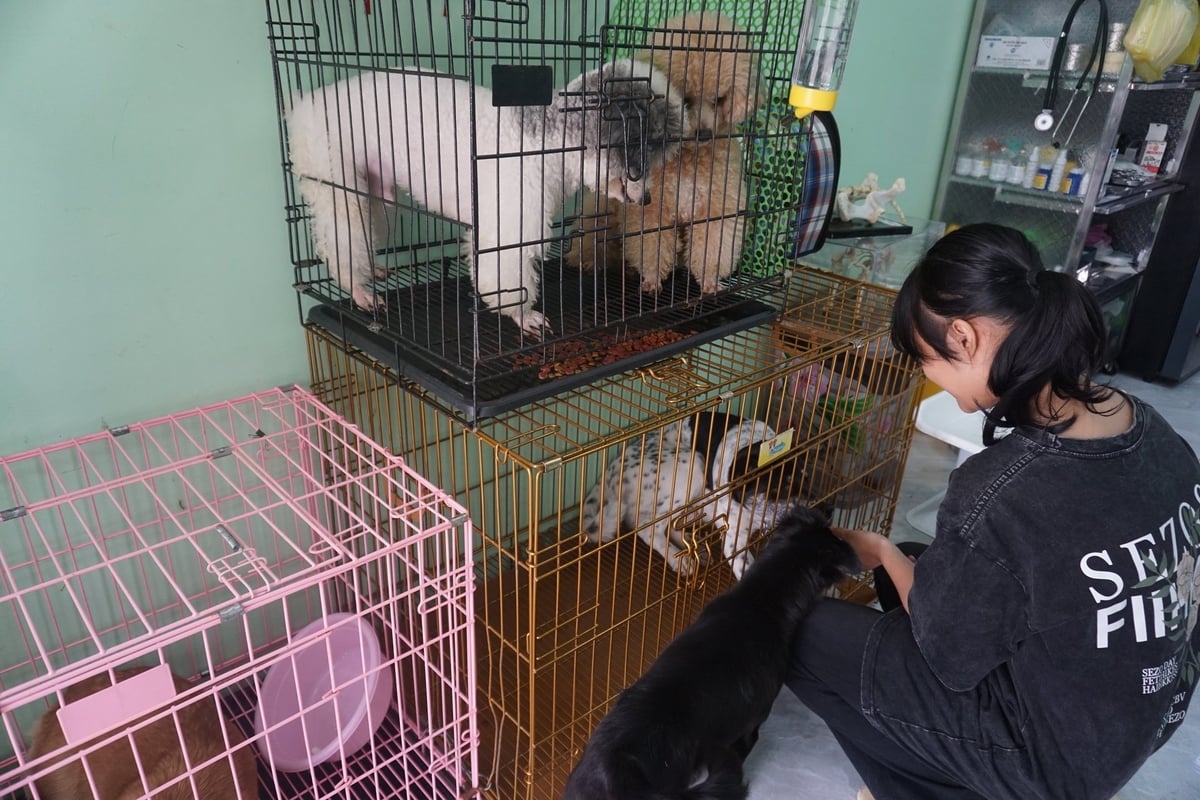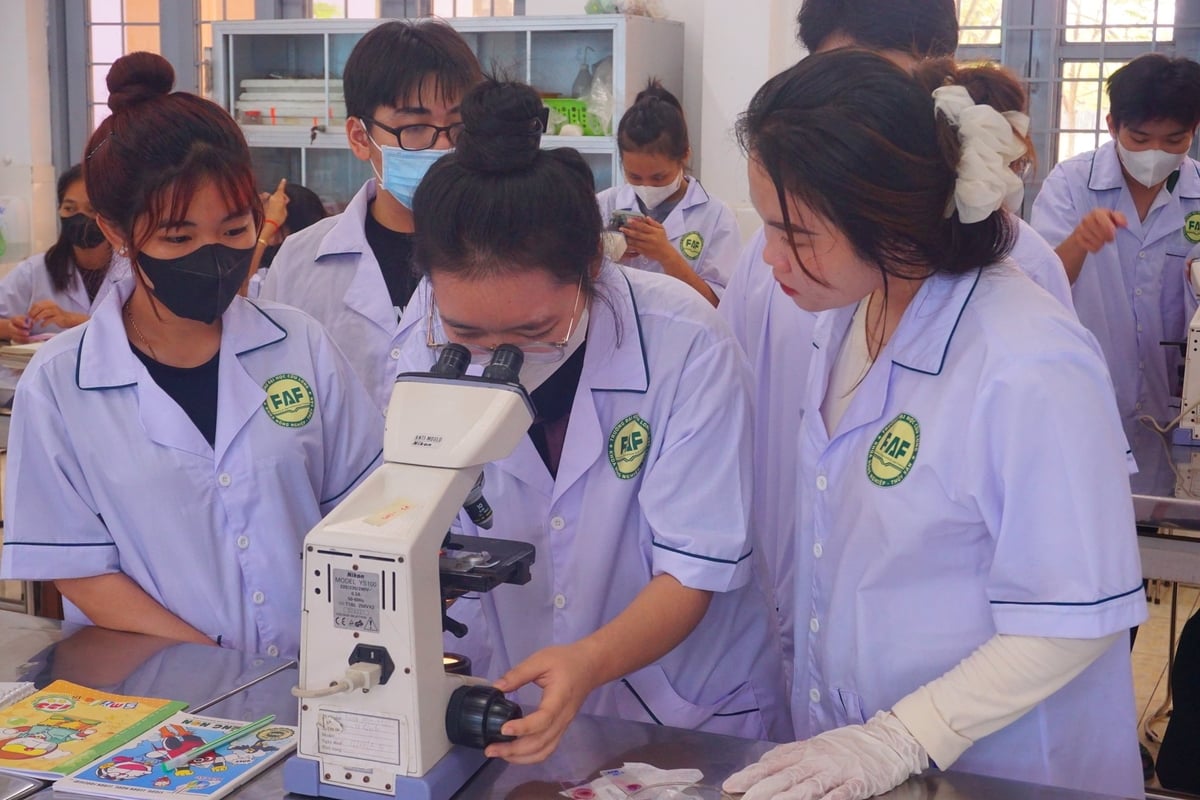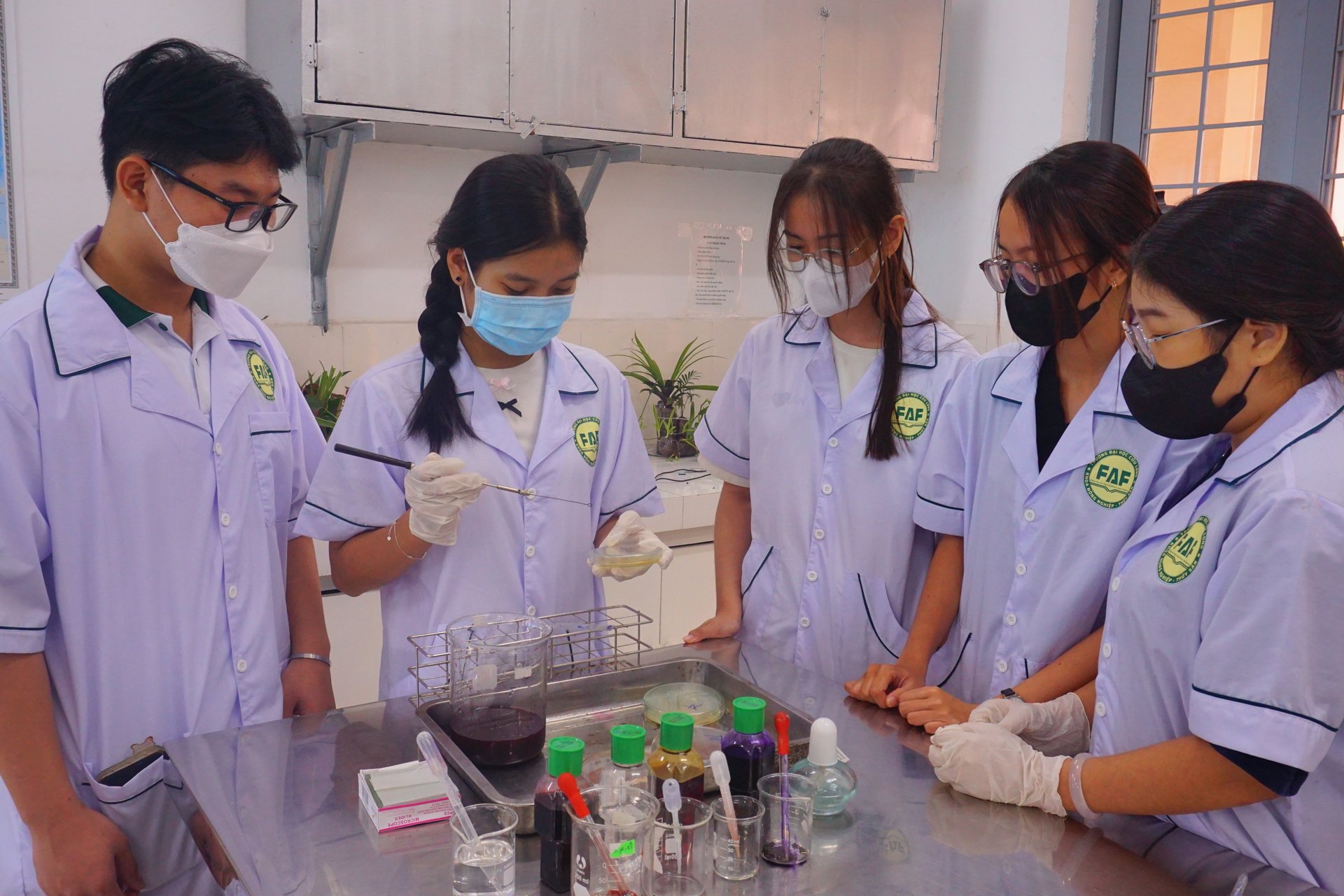May 30, 2025 | 15:08 GMT +7
May 30, 2025 | 15:08 GMT +7
Hotline: 0913.378.918
May 30, 2025 | 15:08 GMT +7
Hotline: 0913.378.918

Students are practicing at the veterinary clinic of Mekong University. Photo: Ho Thao.
Asia Animal Pharmaceutical Limited Liability Company (Achaupharm) is one of the leading enterprises in the industry with nearly 30 years of operation. This business always sees the veterinary staff as an "internal strength", contributing significantly to all of its achievements.
Achaupharm currently has nearly 300 staff, of which approximately 40% are veterinary personnel, distributed in departments from research - testing, production - engineering, to business - market and management. They undertake key tasks such as research and development, quality control, technical support and professional management, demonstrating the "backbone" role within the company’s entire value chain.
According to Nguyen Thi Mai Thao, Deputy General Director of Achaupharm, businesses particularly in the field of livestock production and animal health still face many difficulties in recruitment. The supply of human resources is not up to the demand, and there are high requirements for expertise and skills, while the labor market is fiercely competitive and thus it is difficult to retain talent.
“The company is strengthening its connections with universities, implementing intensive internal training programs, and improving welfare policies to attract high-quality human resources. We also expand our options for recruitment to include personnel from other industries, especially in research, high technology and management positions,” said Deputy General Director Nguyen Thi Mai Thao.

Enterprises identify veterinary force as a key factor for development. Photo: Ho Thao.
Deputy General Director Nguyen Thi Mai Thao believes that the veterinary industry needs close coordination between the government, training schools and relevant parties in order to progress with strong and sustainable development. Raising public awareness, improving the working environment for veterinary human resources and increasing investment in training are deemed the most important factors to meet domestic and foreign recruitment needs.
From the perspective of Dr. Nguyen Kim Quyen, Head of the Faculty of Agriculture and Aquaculture, Mekong University, Vietnam currently lacks an estimated 3 million human resources in the veterinary industry. The problem stems from reality as the livestock industry is constantly modernizing, shifting toward a closed model. The role of veterinarians in disease control and animal health has become more crucial than ever.
Contrary to the current situation of the industry, social awareness of the veterinary profession still has certain limitations. Parents think that studying veterinary medicine is simply treating animals or doing simple work related to animal husbandry, leading to many students who, despite their love and passion for the profession, frequently encounter opposition.
“In reality, students after graduation can work in positions of high demand such as livestock engineers, laboratory specialists, and disease control specialists with starting salaries of VND 7 million/month. In addition, the pet care services sector such as pet spa, grooming, and bathing is also booming, helping students earn extra income while still in school. International labor markets such as Japan and Germany are also lacking veterinarians, which opens up opportunities for new graduates to work abroad," said the Head of the Faculty of Agriculture and Fisheries, Cuu Long University,” said Dr. Nguyen Kim Quyen, Head of the Faculty of Agriculture and Aquaculture, Mekong University.

Third-year students are conducting experiments in the veterinary program. Photo: Ho Thao.
According to Nguyen Thi Mai Thao, Deputy General Director of Achaupharm, the demand for veterinary personnel will continue to increase sharply in the next 3 - 5 years. The positions in serious shortage include livestock and veterinary engineers at farms, sales staff and technical consultants, and research and quality testing experts.
Vietnam has 22 universities training students in the field of livestock production and veterinary research. Approximately 5,000 bachelors and veterinarians graduate from these training institutions each year, but the current market is more demanding than ever.
Over 1,000 businesses of all scales operate in the livestock industry, not to mention nearly 3,000 veterinary clinics and hospitals. Even if a clinic only recruits one veterinarian per year, the market would still need a lot of human resources in this industry.
It is estimated that every year, Vietnam needs 19,000 veterinarians with practice certificates to meet the requirements for research and animal management at farms and livestock companies. In the context of complicated epidemics in livestock and poultry, specifically African swine fever and avian influenza, the shortage of veterinary staff exposes the livestock industry to more risks.
Translated by Samuel Pham

(VAN) WOAH’s guidance aims to mitigate disease risks through a One Health approach that balances economic, conservation, and public health interests.

(VAN) Ms. Nguyen Thi Dung, Deputy Director of Ngoc Hoang Cooperative, shared about the journey of bringing dragon fruit to Europe, achieving annual revenues in the billions of VND.

(VAN) Bamboo products from Thang Tho Bamboo Cooperative have reached many countries around the world, while also creating jobs for local workers.

(VAN) The Management Board of Con Dao National Park reported that a green sea turtle, tagged in the Philippines, has traveled thousands of kilometers to lay 84 eggs on Bay Canh Islet.

(VAN) Green technology is paving a new path for sustainable aquaculture in the Mekong Delta in particular and across the country in general, helping reduce emissions and adapt to climate change.

(VAN) On May 27, La French Tech Vietnam (the French startup and innovation community in Vietnam) held the French Tech Summit Vietnam 2025.